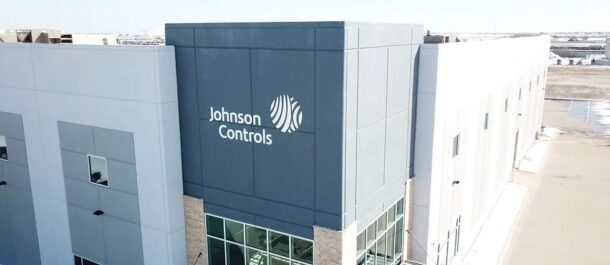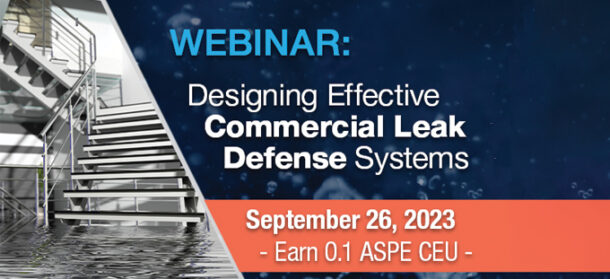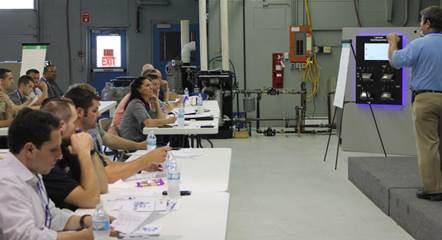The premier business training and coaching provider for the HVAC industry announces the return of the ongoing development program for distribution, designed to enhance territory sales and strategic growth Business Development Resources (BDR), the training and business coaching authority for home services industry professionals, announces its 2024 program for Trailblazer Sales Academy, an ongoing online training program Read more
education

The premier business training and coaching provider for the HVAC industry announces the return of the ongoing development program for distribution, designed to enhance territory sales and strategic growth
Business Development Resources (BDR), the training and business coaching authority for home services industry professionals, announces its 2024 program for Trailblazer Sales Academy, an ongoing online training program for territory managers and distribution sales team members that focuses on developing sales skills, leadership agility and a strategic vision for territory growth.

Business Development Resources (BDR) announces its 2024 program for Trailblazer Sales Academy, an ongoing online training program for territory managers and distribution sales team members that focuses on developing sales skills, leadership agility and a strategic vision for territory growth.
Trailblazer Sales Academy features four live virtual workshops from January through May to help participants start the 2024 year strong in essential areas for HVAC territory managers and outside sales representatives. These four-hour training sessions provide participants with the opportunity to learn the best practices of top-performing territory managers, with topics including:
- Jan. 4: Drive sales and help dealers win in the first quarter
- Feb. 13: Build your strategic sales call process
- April 2: Find the right dealer through targeted prospecting
- May 23: Help dealers install more jobs through labor leverage
“Trailblazer Sales Academy is an opportunity for territory managers to forge a sales path and reap the rewards of their dream territory,” said Sr. Vice President of Training and Marketing Matt MacArthur. “The program empowers members to enhance their business acumen and build a plan while developing their skills in key areas. At the end of the training, participants can implement new processes to drive immediate growth and long-term strategies for taking ownership of their sales areas.”
The academy also includes targeted podcasts and self-paced courses to help participants continue to develop their skills and make the most of the program.
Membership in Trailblazer Sales Academy is limited to just 50 participants in 2024. Discover more and register at https://www.bdrco.com/trailblazer-academy/.

Relaunched training programs include guidance on new residential and commercial heat pump equipment, electrification and low-GWP refrigerants Course fees have been reduced, and in-person and remote options expand access for contractors New, immersive online training programs now available for new contractor certification Johnson Controls, the global leader for smart, healthy and sustainable buildings, announces the Read more
-
Relaunched training programs include guidance on new residential and commercial heat pump equipment, electrification and low-GWP refrigerants
-
Course fees have been reduced, and in-person and remote options expand access for contractors
-
New, immersive online training programs now available for new contractor certification

Johnson Controls, the global leader for smart, healthy and sustainable buildings, announces the launch of its new 2024 Ducted Systems Academy training opportunities and industry resources. The industry-leading programs feature a combination of hands-on experiences, virtual resources, and on-demand and in-person courses at the state-of-the art Ducted Systems Academy in Oklahoma City, Oklahoma. All resources are developed by experienced industry experts and designed to help residential and commercial contractors build knowledge on important topics including new residential and commercial heat pump equipment, electrification and low-global warming potential (low-GWP) refrigerants.
“Our industry is in a state of rapid transformation with several major regulations going into effect, and contractors need up-to-date information to meet these evolving demands,” said Christyn Mueller, manager of commercial learning, Johnson Controls. “Our goal has always been to serve the industry as a resource. We’ve designed our newest training programs for the year ahead to focus on accessibility and affordability so more contractors can get the information they need to be successful and better serve their customers.”
Relaunched in-person training center
Fast advancements in technology and evolving regulations have created a need for contractors to build on their existing knowledge. The Johnson Controls Ducted Systems Academy provides an opportunity for contractors to gain hands-on experience with new equipment, including the latest commercial and residential heat pumps and low-GWP refrigerant systems. The 2024 program offers 40 courses that range from commercial start-up and commissioning to product essentials and customer service training.
To make these programs more widely accessible, Johnson Controls has reduced course fees and is offering train-the-trainer options for some residential technical courses to enable a single contractor to complete the in-person training and recreate the experience at their own location. Additionally, tuition offset programs are available based on partnership program levels.
“We have a trade that demands correct answers the first time,” said Stephen Love, technical service manager, Johnstone Supply. “The partnership between Johnson Controls and Johnstone Supply allows us the ability to have great technical training resources. In turn, it allows our participants to learn, practice, and perfect their trade at the Johnson Controls Ducted Systems Academy.”

One-Minute Expert program
Available within the Ducted Systems Solutions App, One-Minute Expert is a group of tools that provides instant access to quick reference guides, approximately 100 videos and customer-facing resources on one easy-to-use platform. The program is free and designed to provide valuable insights on important topics such as low-GWP refrigerants, new equipment installation, electrification, and heat pump knowledge – all within a new, time-saving format. New resources are being added monthly.
Tech Foundry courses
In response to the industry’s workforce development needs, Johnson Controls has relaunched its proven Tech Foundry, an immersive residential and commercial contractor training program in a hybrid format designed to fit within busy schedules. The 10-week course integrates remote and live learning with mentor support and peer interaction to review topics such as: refrigeration systems and compressors, tubing and piping, ventilation systems, and heating and cooling loads. A network of local labs is utilized throughout the online session to provide weekly hands-on experiences, and the program culminates with a 3-day hands-on immersion conducted in-person at the Johnson Controls Ducted Systems Academy.
Virtual courses and recertification
For contractors unable to attend in-person trainings, a series of webinars will be introduced in 2024 that include new product introductions, competitive differentiation, sales skills and low-GWP refrigerants. Additionally, virtual recertification options are available to individuals who have previously received in-person startup and commissioning certification.
For more information about the Johnson Controls Ducted Systems Academy and to preview the 2024 course catalog, please visit DuctedSystemsAcademy.com.

Leak Defense®, a Watts Brand, will host a live APSE-accredited CEU webinar — “Designing Effective Commercial Leak Defense Systems” on Tuesday, September 26th at 12 p.m. ET. Attendees will learn about the different tier levels of leak detection and how designing one of these systems can mitigate the risk associated with water damage from leaks Read more

Leak Defense®, a Watts Brand, will host a live APSE-accredited CEU webinar — “Designing Effective Commercial Leak Defense Systems” on Tuesday, September 26th at 12 p.m. ET.
Attendees will learn about the different tier levels of leak detection and how designing one of these systems can mitigate the risk associated with water damage from leaks. Participants can earn 0.1 ASPE CEU that counts toward professional development and licensure requirements.
In this webinar, industry subject matter experts will discuss:
- Why water leak detection is critical in multi-family & commercial structures
- Which buildings are at the greatest risk for leaks and water damage
- Advantages and weaknesses of different types of leak detection systems
- The basic operation of a flow-based leak detection system
- The potential return on investment for a flow-based leak detection system
To register, www.watts.com/LeakDetectionCEU.

Can a hydronic system effectively – and efficiently – provide heating, cooling, domestic hot water AND heat recovery ventilation in a residential home? John Siegenthaler, P.E., a favorite to the webinar series, will discuss design details, challenges and lessons learned from a from a recent project profile of a modern hybrid approach utilizing an air-to-water heat Read more
Can a hydronic system effectively – and efficiently – provide heating, cooling, domestic hot water AND heat recovery ventilation in a residential home? John Siegenthaler, P.E., a favorite to the webinar series, will discuss design details, challenges and lessons learned from a from a recent project profile of a modern hybrid approach utilizing an air-to-water heat pump system that checks all of the boxes during this 90-minute extended edition.
You’ll learn:
→ Back-up heating. When is it necessary?
→ Can a single 44 watt circulator supply all space heating flow for a 2,300 square foot house?
→ Does chilled water cooling and heat recovery ventilation require separate duct systems?
→ Can panel radiators operate at supply water temperature below 100 ºF on design days?
→ Where does an “extended manifold” piping system make sense?
→ How are 3-way diverter valves applied in air-to-water heat pump systems?
→ What are the advantages of multi-zone heating combined with single-zone cooling?
Siegenthaler is a seasoned industry leader and passionate teacher, eager to share his over 40 years’ experience in the understanding and proper application of water-based engineering principles with our audience. He is the principal of Appropriate Designs and a regular contributor to industry publications.
Coffee with Caleffi technical training webinars are free and intended for contractors, designers and wholesalers. A Certificate of Attendance is emailed to attendees following the webinar for continuing education consideration. Want to join us? Simply register today.

Residential heating contractors can hone their boiler technology and hydronic skills and knowledge by participating in a Weil-McLain® 2023 School of Better Heating training program this fall. The School of Better Heating program is an annual series of comprehensive condensing boiler technology training seminars from the leading North American designer and manufacturer of hydronic comfort heating systems. The Read more
Residential heating contractors can hone their boiler technology and hydronic skills and knowledge by participating in a Weil-McLain® 2023 School of Better Heating training program this fall. The School of Better Heating program is an annual series of comprehensive condensing boiler technology training seminars from the leading North American designer and manufacturer of hydronic comfort heating systems.

The Condensing Boiler Technology & Hydronic Fundamentals course will be available in one- and two-day sessions and feature seminars and hands-on training for condensing gas boilers, including Weil-McLain’s ECO® Tec Series 2 high-efficiency premium residential boiler. This year’s training schedule kicks off in Pittsburgh on September 12 and will continue through November at various locations in the Eastern and Central regions of the country, including:
- September 12 – Pittsburgh
- September 13 – Cleveland
- September 13-14 – Westchester County, N.Y. (Two-day session)
- September 19 – Stevens Point, Wis.
- September 21 – Milwaukee
- September 26 – Duluth, Minn.
- September 26-27 – New England / Raynham, Mass. (Two-day session)
- September 28 – Twin Cities, Minn.
- October 10 – Detroit
- October 12 – Cincinnati
- November 2 – Akron, Ohio
Each course will cover the following objectives:
- Hydronics basics and fundamentals
- Design, construction and operation of condensing boilers
- Proper installation, venting, piping and wiring, as well as set-up and programming of controls
- Boiler start-up, maintenance and troubleshooting
Registration for this year’s School of Better Heating classes is $99 for the one-day sessions and $199 for the two-day sessions, and includes reference materials, breakfast and lunch and a certificate of completion. For more information or to register online, visit www.weil-mclain.com/residential-training.
